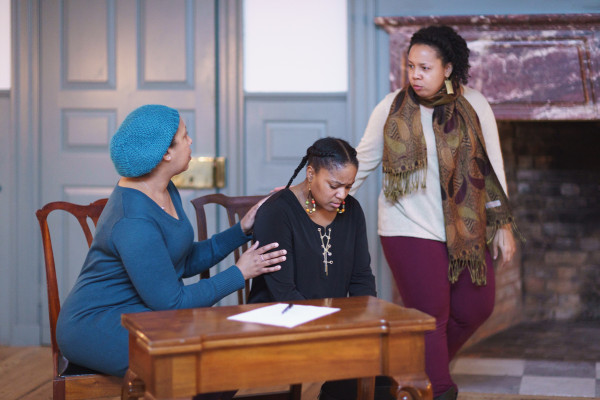
Secrets are revealed, suspicions voiced, relationships challenged. Take Downton Abbey, mix in some elements of The Good Wife, and move it to colonial Virginia, and you might have something like Affairs of the Heart.
The evening program, an old favorite, has been brought back after about a 15-year hiatus. Its themes are still timeless.
Without giving too much away, the action takes place at William’s plantation as he prepares to marry Anne. Uncertainty threatens to mar the festive mood, though. The arrival of a new mistress promises to shake up the household, which includes many enslaved people. So instead of a new couple heading off to make their way in the world, this is more like blending established families.
In its previous incarnation Affairs of the Heart was staged at the Wythe House, with the audience moving location to see different scenes. It has been revised to be a more traditional stage production. The new setting, a candle-lit Apollo Room in the Raleigh Tavern, possesses an intimacy to match the subject matter.
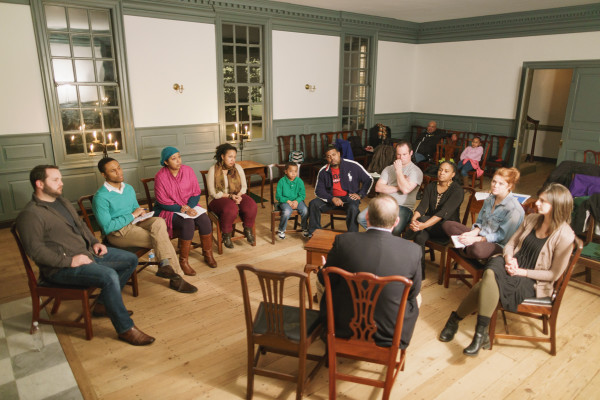
I sat down with the cast during a break in rehearsal to talk about how they viewed the show’s themes and their roles in it.
Everyone agreed that one of its strongest elements was its relatability. Across more than two hundred years, it still speaks to us. It asks questions we have to answer every day, though perhaps quite differently than two centuries ago:
How well do we truly know the person we marry? What secrets do we keep? Should we shield children from the truth?
And from a historical perspective, the show offers insights into the spaces where black and white people lived in close quarters. On the spectrum of intimacy and cruelty in a slave society, how did people actually treat each other? Affairs of the Heart presents a plausible scenario for how that might have played out.
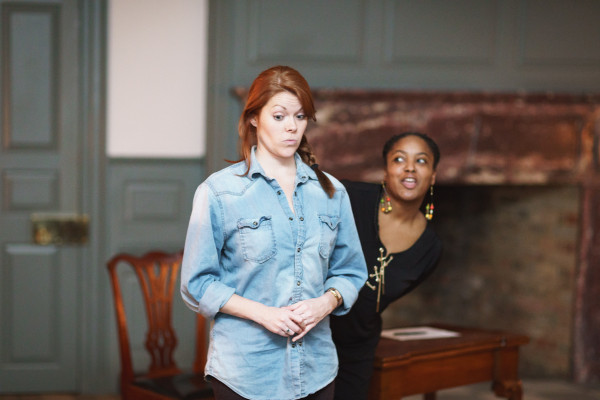
Whitney Thornberry, who plays Anne, said, “It’s the gray part of our history, where you know what’s happening is terrible, but you don’t want to think of all the people as terrible.”
“Human nature is human nature,” offered Michael Empson, who plays William. “It hasn’t changed that much.” While social structures like race, class, and gender affect how we act, he sees an essential humanity (for good or ill) on full display in the program.
That doesn’t entirely mean acting like someone else, much less someone who lived centuries ago. “Whenever you’re playing a role,” he said, “it’s not putting a mask on, it’s finding that part of you and letting it come out. All those different parts are inside every one of us. There’s good and evil and every shade in between.”
The actors search for their own connections to their roles. During rehearsal even tiny gestures and glances are discussed. Would he look out the window while he was talking? Do they make eye contact? Is her tone of voice dismissive or just indifferent?
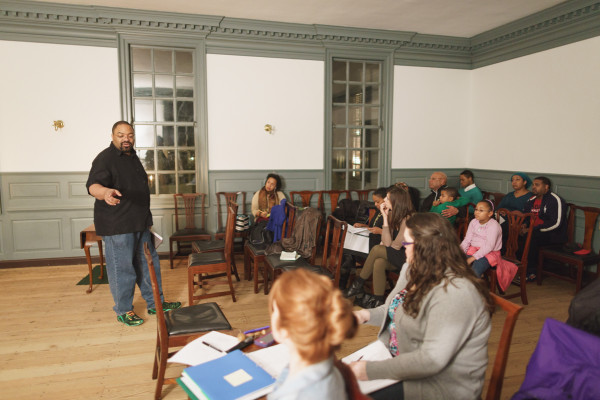
Stephen Seals, who is directing the program, offers comments after each scene. They play, experiment. Different opinions are welcome, and I think there is something wonderful about wrestling with this problem of finding that authentic-sounding 18th-century voice.
Whitney is trying to make peace with her character’s foreign worldview. “You know what’s happening is terrible,” she says, “but you don’t want to think of all the people as terrible.
“The first time I read the script, I thought there’s nothing whatsoever redeemable about my character. But I couldn’t play her that way. There had to be a reason for her to behave the way she does. She’s definitely a young, scared woman of the 18th century who thinks that she knows her place, but her entire world is different from what she thought it was.”
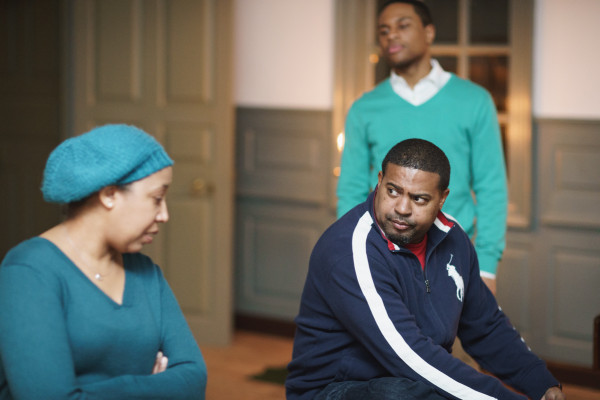
“I see it differently,” interjects Willie Wright, who portrays Ben, an enslaved African American man in the household. He sees Anne as willfully ignorant, hypocritically ignoring what’s right in front of her because it serves her own interest. “The gentry class acted one way in public, but behind closed doors it was different.”
“It’s a cultural veneer. Even today in 2016 we can have trouble seeing through it. We put these people on pedestals and don’t see the truth.”
“It’s not like these masters and mistresses are stark raving mad, but there is cruelty and thoughtlessness” in their actions, says Hope Wright, who plays Nancy.
This is evident in Anne’s treatment of Venus, her enslaved person who accompanies her to William’s home. Tamara Barnes sees her character, Venus, as someone forced to live a dual existence, maidservant to Anne but also trying to have her own family life.
Willie argues that in a slave society is a fantasy world where those in power simply convince themselves that what they’re doing is right. “They can’t believe everything they’re saying.”
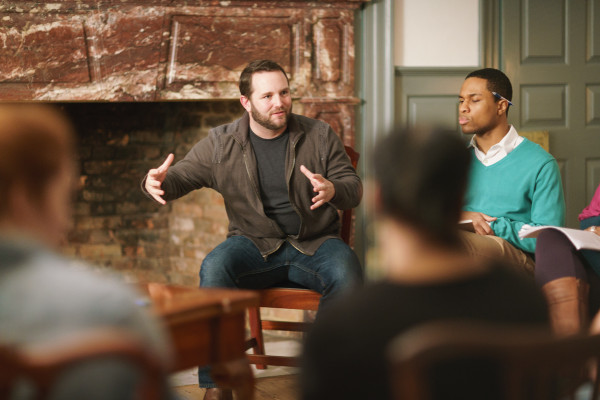
Michael disagrees. “I think they do believe what they’re saying. That’s the horror of it. They believe that one group is superior to another.”
The conversation is much like those audiences will likely have after seeing a performance. “One of the great things about theater,” says Tamara, “is that people can come and open themselves up to new experiences and different perspectives.”
And heck, this is supposed to be a story about love.
Jamar Jones, who portrays Caesar, another enslaved member of the household, brings it back to that central theme in a way that resonates strongly today. “There can be a lot of judgment in society about love—who you love and how you love. This explores the perspectives of several characters and how their feelings affect others.
“What these people want is what they can’t have. And somebody watching this play is going to be going through the same thing.”
“Life is very very messy. That’s the crux of the show,” says Whitney.
Willie joins in: “History is messy, too.”
Affairs of the Heart will be staged on Wednesday evenings at the Raleigh Tavern beginning March 23. Learn more here.
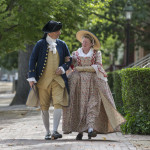

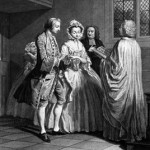
Is this an actual 18th century play, as some others presented at CW have been? Or is it more modern? From the hints here, I am guessing modern.
Who is/are the authors?
Linda,
Thanks for your question. It is indeed a modern play, written perhaps 20 years ago. I have to inquire about who the author or authors were.
It was originally written by Christie Coleman, then revised and lengthened last year by Rose McAphee and Stephen Seals. In its original iteration the audience moved around to see a series of vignettes. Now it is more of a traditional staging.
I am thrilled that this wonderful program is being offered during our upcoming trip to CW. I was privileged to see this program in its previous incarnation and the impact of the program has stayed with me for almost 20 years. I especially valued the group conversation with the actors after the completion of the actual program. I walked away from this program with new insights and understandings. I look forward to sharing this experience with family who have not seen it in the past. Thank you CW for bringing back this evening program.